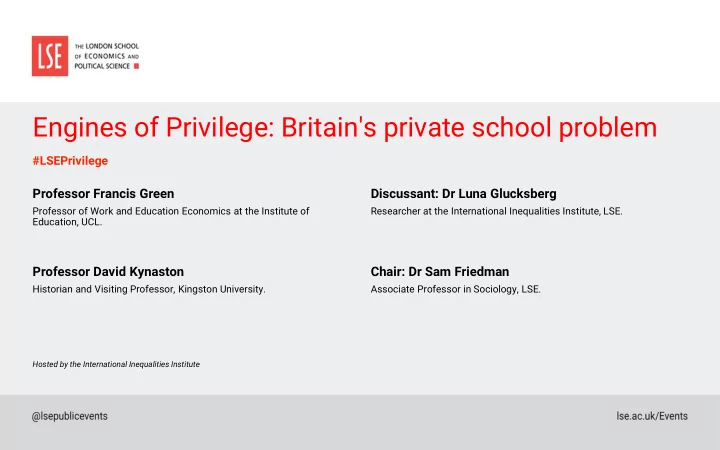

Engines of Privilege: Britain's private school problem #LSEPrivilege Professor Francis Green Discussant: Dr Luna Glucksberg Professor of Work and Education Economics at the Institute of Researcher at the International Inequalities Institute, LSE. Education, UCL. Professor David Kynaston Chair: Dr Sam Friedman Historian and Visiting Professor, Kingston University. Associate Professor in Sociology, LSE. Hosted by the International Inequalities Institute
2
Why worry about private schools? • Only 1 in 16 pupils overall • Yet: 1 in every 7 teachers is in the private sector; ~ £1 in every £6 of expenditure is in private schools; this means a private/state resource gap of about £3 to £1 for each pupil beacons of inequality 3
Typical private school
Typical state schools 5
What does the evidence say? • Better educational outcomes at all stages of education • Better access to universities • Better chances of success in the labour market 6
7
.8 Participation in private school is .6 Participation Rate concentrated at .4 the very top of .2 the income distribution. 0 5 15 25 35 45 55 65 75 85 95 Income Percentile Private Education 95%-CI Participation in private school education across family income percentiles
What’s the problem? • Systemic inefficiency • Democratic deficit • Unfairness/ reproduction of privilege (low social mobility) 9
Alan Bennett’s sermon in Cambridge ‘Private education is not fair. Those who provide it know it. Those who pay for it know it. Those who have to sacrifice in order to purchase it know it. And those who receive it know it, or should. And if their education ends without it dawning on them, then that education has been wasted.’ 10
Our Populus poll: “It is unfair that some people with a lot of money get a better education and life chances for their children by paying for a private school” 11
Agree 18% Neutral 19% 63% Disagree Populus 12
13
Abu cartoon, Guardian 1968 14
Options for reform • Curtailing demand • contextual admissions • taxation • Crossing the tracks/integrating supply • with private control over admissions • with social control over admissions 15
Curtailing demand: • contextual admissions • taxation 16
Crossing the tracks: • Private control over admissions • Open Access Scheme • others • Social control over admissions • Fair Access Scheme • ‘Abolition’ 17
What won’t work: • removing charitable status • the ‘politics of hypocrisy’ • small scale schemes • private philanthropy/bursaries • small scale schemes 18
Agree 18% Neutral 19% 63% Disagree Populus 19
Private school insiders’ views on unfairness Agree 29% 51% Neutral 20% 20
21
Recommend
More recommend